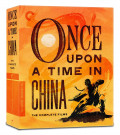| Reviews & Columns |
|
Reviews DVD TV on DVD Blu-ray 4K UHD International DVDs In Theaters Reviews by Studio Video Games Features Collector Series DVDs Easter Egg Database Interviews DVD Talk Radio Feature Articles Columns Anime Talk DVD Savant Horror DVDs The M.O.D. Squad Art House HD Talk Silent DVD
|
DVD Talk Forum |
|
|
| Resources |
|
DVD Price Search Customer Service #'s RCE Info Links |
|
Columns
|
|
|
Once Upon a Time in China: The Complete Films - Criterion Collection
The Collection:
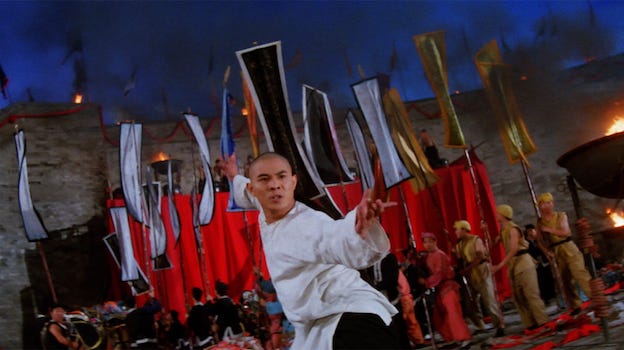
The Once Upon a Time in China series is an odd mix of ambitious epic storytelling and schlocky showmanship. The series, captained by Tsui Hark (Zu Warriors, the Detective Dee films), played an instrumental part in establishing a new language for Hong Kong martial arts films that captivated nerds in the '90s and paved the way for the genre to cross over worldwide in the '00s. Once Upon a Time in China made Jet Li a star and revived a beloved movie character/folk hero, Wong Fei-Hung, for a new generation of filmgoers.
The Criterion Collection's new box set is called Once Upon a Time In China: The Complete Films, and it includes all six films that Tsui produced (and mostly directed) -- although only the first five are officially considered "the series." The sixth film, the Sammo Hung-choreographed and -directed Once Upon a Time in China and America, is listed as a bonus feature. Now, there are plenty of reasons why this sixth entry could be considered outside of the series, but none of them are compelling to this reviewer. So it counts as part of the main program to me.
Once Upon a Time in China begins in the late 1800s, in the city of Foshan. This is where Wong Fei-Hung has a school to train the local militia in martial arts and where he also provides medical care to the locals. (He's like Toshiro Mifune's Red Beard if Red Beard could also do amazingly acrobatic kung fu.) It's a turbulent time, in which foreign powers are jockeying for their own stake in the country. In much the way that American action movies of the '80s would pick characters from different Latin American and Arab countries as their generic brown baddies, the Once Upon a Time in China series grabs the whole bag of European nationalities to feature as villains. The countries may change, but the message is clear: generic white guys = bad. In this first film, it's a mix of British businessmen and American slavers who earn the boos and hisses.
Wong Fei-Hung has a fun crew of students, some of whom carry over to later films, including stuttering American cousin Bucktooth So (As Tears Go By's Jacky Cheung, later replaced by multiple actors), overweight pork butcher Porky Wing (Kent Cheng), and uncertain new recruit Leung Foon (initially played by Yuen Biao). They all bounce off of the even-keeled temperament and slightly old-fashioned manners of Jet Li's Wong in different ways.
A starker character contrast comes from Rosamund Kwan as Siu-kwan, better known as "13th Aunt." A young and lively woman who has spent enough time abroad to absorb the fashion and habits of a Westerner, 13th Aunt tries to open traditionalist Fei-Hung's eyes to the benefits of western technological innovations. She is also in love with him -- and secretly, he with her. You see, they're not blood relations, although some sort of intermarriage technicality has made them relatives -- which makes their love taboo in a traditional sense. The excellent chemistry between Li and Kwan makes the ongoing romantic story arc as exciting a reason to return to the films as the boffo fight scenes.
And speaking of those fights, the first two films feature inventively kinetic choreography by the legendary Yuen Wo-Ping. A jaw-dropping aerial duel on ever-shifting bamboo ladders in the first flick remains one of the coolest martial arts sequences committed to film.
There's a flavor of the Indiana Jones series in these historical adventures, which might just be a symptom of the era and not quite self-conscious homage. However, the main villains in Once Upon a Time in China II -- an anti-foreigner religious cult with claims of supernatural powers -- share some DNA with the antagonists of Temple of Doom. The set-up for the second film has Wong Fei-Hung, 13th Aunt, and Leung Foon (played by Pedicab Driver's Max Mok for the rest of the series) travel to Canton so that Fei-Hung can deliver a speech at a western medical convention. There, they encounter legendary democratic statesman Sun Yat-Sen, corrupt military officers, and that weird religious cult. Donnie Yen is a perfect acrobatic foil for Jet Li as an antagonistic loyalist officer with a surprisingly destructive weapon made of simple cloth.
The third film is less thematically ambitious than its predecessors -- and new fight director Yuen Bun has a less impressive signature style than the legend he replaces -- but Once Upon a Time in China III has the easygoing attitude of a franchise settling in for the long haul. The action moves to Beijing, and the central conflict involves a martial arts competition between lion dancing associations. (Lion dancers use those ornate animal costumes most filmgoers would associate with Chinese New Year celebrations.) Wong Fei-Hung reconnects with his father and discovers a local martial arts club is bullying the others to stay out of the competition. Fei-Hung refuses to back down, and converts a powerful henchman named Clubfoot (Hung Yan-Yan) to his side. Meanwhile, 13th Aunt is wooed by a Russian who gives her a movie camera -- but who is probably a villain because... well... see above rule about generic white guys in this series. The climactic competition clearly tries to top the gravity-defying stunts of the first film -- and is wildly entertaining thanks to that effort.
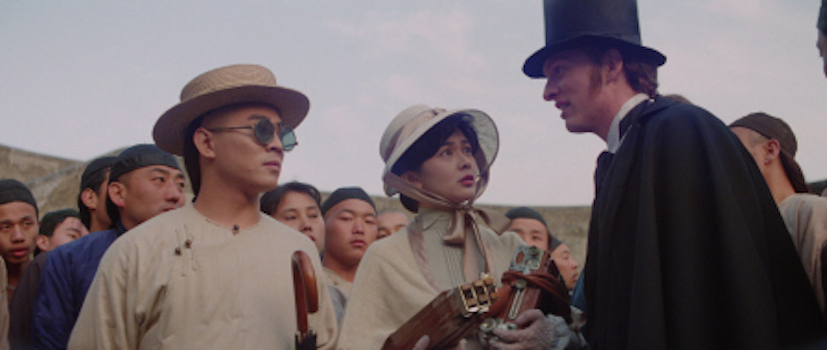
Many fans stop here, because Jet Li leaves the series. In the Blu-ray supplements, critic Tony Rayns makes a case that Tsui Hark's full planned arc for Wong Fei-Hung is best appreciated by continuing on to the fifth film. But, sorry Tony, the fourth and fifth films are broader, sillier, and straight up less fun. In other words, fans can be forgiven for not being completists.
That's not to say there's nothing to appreciate in Once Upon a Time in China IV and V. Star Vincent Zhao lacks the good guy charisma of Jet Li, but he is a capable fighter. The fourth film (directed by choreographer Yuen Bun) pits Zhao against a rebel girl gang called the Red Lanterns and their acrobatic dust-ups are suitably impressive. It's in the areas of story and character that IV underwhelms. The main plot is a shameless retread of III's martial arts competition, but with bigger and badder opponents. Rosamund Kwan also did not return for IV (although she comes back for V and America), which not only interrupts the flow of the love story but needlessly places Wong Fei-Hung in a love triangle with *eyeroll* "14th Aunt" (Jean Wang) and the leader of the Red Lanterns (Wang Jinghua) -- both of whom are Rosamund Kwan lookalikes.
It's a delight to see Kwan return for part V, but unfortunately she and Vincent Zhao have no chemistry. Tsui Hark is back as well, but his direction lacks spark and invention. Tsui's long-game allegory with this series, concerning the handover of Hong Kong to China in 1997, bears fruit in V, as the story deals with corruption and turmoil after the collapse of the Qing dynasty. But too much of this flick is dull as dishwater. The fights are hit-and-miss too, with a sequence involving a century-old pirate who literally hoots like Daffy Duck while protecting his Goonies-esque treasure cave as an oddball highlight.
Then, Tsui, Zhao, and some of the supporting cast took their Wong Fei-Hung shenanigans to the small screen for twenty episodes in 1995 and 1996. We don't get to see any of those in this set.
In 1997, Jet Li decided to return to the character of Wong Fei-Hung for a big-screen film set and shot in America, the western pastiche Once Upon a Time in China and America. While America matches the campier tone of parts IV and V, making it admittedly feel lesser-than to the initial trilogy, this is a satisfyingly fun outing. Wong Fei-Hung, 13th Aunt, and Clubfoot travel to the U.S. to visit Bucktooth So, but they are separated in an accident and Fei-Hung gets amnesia. Fei-Hung is taken in by a generic tribe of natives while the others look for him. The nearby town is full of corrupt white folks (natch), but a blonde-haired outlaw named Billy (Jeff Wolfe) lends a hand -- and his gun -- to our heroes' cause.
The plot is a whiff, but there are some solid action scenes -- the best being Clubfoot's attempt to jog Wong Fei-Hung's memory by fighting in the different styles of bad guys from the previous films. The love subplot is frustratingly rote, with 13th Aunt incorrectly jealous (again), but it does the film immeasurable good to re-team Jet Li and Rosamund Kwan. They are a genuinely cute couple.
In the end, the Once Upon a Time in China series is wildly inconsistent. One can see why it's tempting to put an asterisk next to certain films while highlighting others. Still, for modern kung fu fans, the influence of this series cannot be underestimated. Criterion has put together a great set that gives the series its due -- and then some.
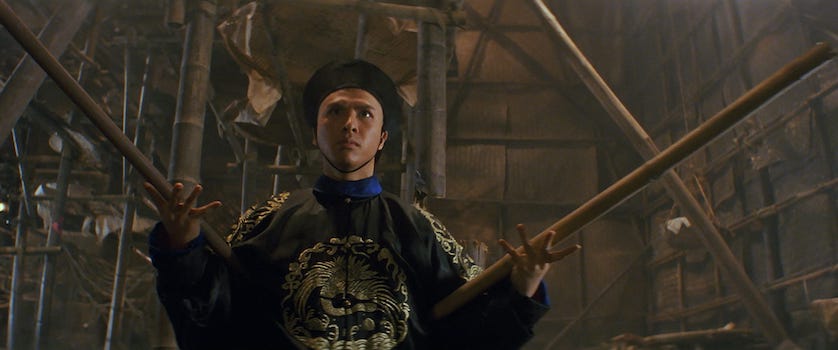
The Blu-ray
Once Upon a Time in China: The Complete Films is presented on 6 Blu-ray discs, with each film on its own disc. The set is packaged in a thin cardboard box containing a 3-panel DigiPak, with two discs overlapping in each panel. A booklet featuring writing by Maggie Lee and Grady Hendrix is also included.
The Video:
Considering the cultural value attached to each of these films, it is unsurprising that the AVC-encoded 1080p 2.39:1 presentations are a little variable as the series goes along. In general, the films look quite good -- and I'm told that the 4K restoration on the initial trilogy looks negligibly different from Eureka's limited-edition UK release from a few years ago. Certain process shots in the first film look a little dupe-y, but in general depth and detail are strong. Colors are vivid and organic. The latter three parts receive 2K restorations that still seem to represent them well. In HD, there's no dramatic step-down for these later films. Nitpickers might find America a little less sharp than the rest, possibly due to an older master (??).
The Audio:
This might get confusing, so I'll try to be clear. All six films offer at least a Cantonese LPCM mono mix of the soundtrack. Parts I-III also offer Cantonese LPCM stereo mixes that -- due to the vague wording in Criterion's supplemental material -- I must conjecture are later remixes that might also feature some re-recorded dialogue. Some of the films force you to make your language and subtitles picks from the menu only, which makes me further suspect there might be slight differences between tracks (although I didn't spot any myself). The discs default to mono, for authenticity's sake, but the stereo remixes are across-the-board more satisfying, forceful, and often flat-out have higher fidelity. America defaults to a Cantonese DTS-HD MA 5.1 surround mix that is perfectly fine. It is the only film in the set with a Mandarin LPCM stereo option. All films have optional English subtitles, although some cannot be flicked on and off during viewing and must be changed in the menu.
Special Features:
(HD, 15:49) - Producer-director Tsui talks about his fondness for older Wong Fei-Hung movies and how he tried to find relevance for a '90s audience. He talks somewhat about the production of the films, going into some detail about the showstopping ladder sequence in the first film and how it was conceived on set after star Jet Li was injured.
Final Thoughts:
The Once Upon a Time in China film series is epic and thrilling, and sloppy and silly. Criterion does an excellent job of presenting this influential collection of films with reverence and class -- even if later sequels don't entirely deserve it. (Ha ha.) Another must-own box set from the label. DVD Talk Collector Series.
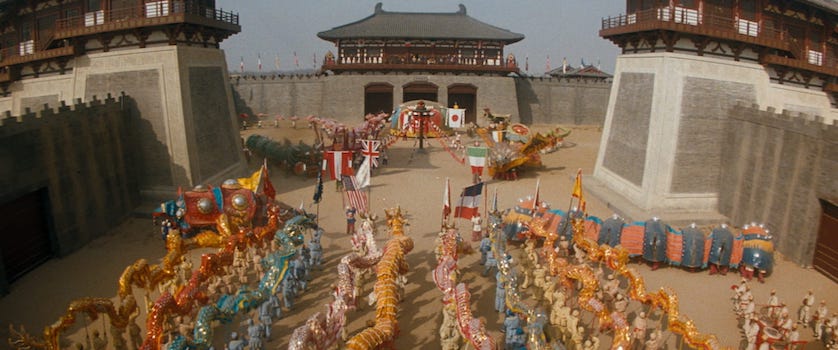
Justin Remer is a frequent wearer of beards. His new album of experimental ambient music, Joyce, is available on Bandcamp, Spotify, Apple, and wherever else fine music is enjoyed. He directed a folk-rock documentary called Making Lovers & Dollars, which is now streaming. He also can found be found online reading short stories and rambling about pop music.
|
| Popular Reviews |
| Sponsored Links |
|
|
| Sponsored Links |
|
|
| Release List | Reviews | Shop | Newsletter | Forum | DVD Giveaways | Blu-Ray | Advertise |
|
Copyright 2024 DVDTalk.com All Rights Reserved. Legal Info, Privacy Policy, Terms of Use,
Manage Preferences,
Your Privacy Choices | |||||||









